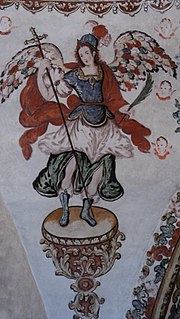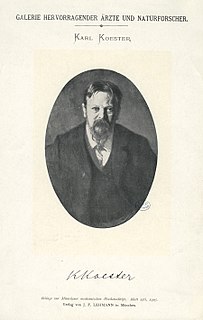Bernhard Maier (born 1963 in Oberkirch, Baden) is a German professor of religious studies, who publishes mainly on Celtic culture and religion. [1]

Oberkirch is a town in Western Baden-Württemberg, Germany about 12 km North-East of Offenburg and belongs to the Ortenaukreis district.

Religious studies, also known as the study of religion, is an academic field devoted to research into religious beliefs, behaviors, and institutions. It describes, compares, interprets, and explains religion, emphasizing systematic, historically based, and cross-cultural perspectives.

Celtic studies or Celtology is the academic discipline occupied with the study of any sort of cultural output relating to the Celtic people. This ranges from linguistics, literature and art history, archaeology and history, the focus lying on the study of the various Celtic languages, living and extinct. The primary areas of focus are the six Celtic languages currently in use: Irish, Scottish Gaelic, Manx, Welsh, Cornish, and Breton.
Contents
Maier studied comparative religion, comparative linguistics, Celtic and Semitic studies at the Albert-Ludwigs-Universität Freiburg, University of Aberystwyth, the Rheinische Friedrich-Wilhelms-Universität Bonn and University of London. He earned his PhD with a doctorate thesis on the Celtic concept of kingship and its Oriental parallels: "König und Göttin. Die keltische Auffassung des Königtums und ihre orientalischen Parallelen".

Comparative religion is the branch of the study of religions concerned with the systematic comparison of the doctrines and practices of the world's religions. In general the comparative study of religion yields a deeper understanding of the fundamental philosophical concerns of religion such as ethics, metaphysics, and the nature and forms of salvation. Studying such material is meant to give one a broadened and more sophisticated understanding of human beliefs and practices regarding the sacred, numinous, spiritual, and divine.
Comparative linguistics is a branch of historical linguistics that is concerned with comparing languages to establish their historical relatedness.
Semitic studies, or Semitology, is the academic field dedicated to the studies of Semitic languages and literatures and the history of the Semitic-speaking peoples. A person may be called a Semiticist or a Semitist, both terms being equivalent.
In 1998 he qualified as a professor at the Rheinische Friedrich-Wilhelms University in Bonn with a habilitation thesis on the religion of the Celts: "Die Religion der Kelten: Götter, Mythen, Weltbild". He was rewarded with the Heisenberg Fellowship of the German Research Foundation (DFG) from 1999 to 2004. From 2004 to 2006 he was Reader and Professor of Celtic at the University of Aberdeen. Since 2006 he is Professor of religious studies and European history of religion at the University of Tübingen.

The University of Aberdeen is a public research university in Aberdeen, Scotland. It is an ancient university founded in 1495 when William Elphinstone, Bishop of Aberdeen and Chancellor of Scotland, petitioned Pope Alexander VI on behalf of James IV, King of Scots to establish King's College, making it Scotland's third-oldest university and the fifth-oldest in the English-speaking world. Today, Aberdeen is consistently ranked among the top 200 universities in the world and is ranked within the top 30 universities in the United Kingdom. In the 2019 Times Higher Education University Impact Rankings, Aberdeen was ranked 31st in the world for impact on society. Aberdeen was also named the 2019 Scottish University of the Year by The Times and Sunday Times Good University Guide.
The history of religion refers to the written record of human religious experiences and ideas. This period of religious history begins with the invention of writing about 5,200 years ago. The prehistory of religion involves the study of religious beliefs that existed prior to the advent of written records. One can also study comparative religious chronology through a timeline of religion. Writing played a major role in standardizing religious texts regardless of time or location, and making easier the memorization of prayers and divine rules. The case of the Bible involves the collation of multiple oral texts handed down over the centuries.

The University of Tübingen, officially the Eberhard Karls University of Tübingen, is a public research university located in the city of Tübingen, Baden-Württemberg, Germany.





